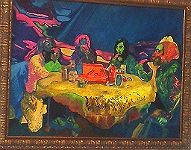I just read Ezra Levant’s Shakedown: How Our Government is Undermining Democracy in the Name of Human Rights. It is a clear, concise and very readable book, which any layman can pick up and learn from. It has a mixture of HRC case studies, factual and statistical information about the HRCs, and Levant’s suggestion for how to deal with this problem, which in his assessment is the complete dismantling of the Commissions.
Levant sees Canada as a society which has evolved from its racist past to what is now a tolerant, multicultural society, with many safeguards against racism, and which consequently doesn’t need the HRCs any longer.
These points deserve more attention, but suffice to say that the Canada of yonder years wasn’t nearly as racist as Levant paints it to be, and the Canada of recent years is far less harmoniously multicultural than he makes out. The recent Tamil protestors (by the thousands), the Lebanese dual citizens who are being shipped to Lebanon to vote in their elections, and Muslims filing HRC cases against MacLeans and Levant himself, expose the reality behind the harmonious multicultural Canada.
There is also a March 31, 2009 Globe and Mail article, where second generation visible minority immigrants feel less Canadian than even their parents, all this despite the country’s overwhelming attempt to accommodate them and their parents.
And a recent report by Ryerson University’s Diversity Institute showed the lack of leadership positions held by visible minority immigrants both in public and private institutions, implicitly indicating systemic discrimination in these institutions.
In the first one hundred pages of Shakedown, the majority of cases Levant gave as examples were filed by visible minorities, who felt they were not getting equal treatment because of their ethnic, racial or religious background.
In my preliminarily calculations of HRC cases filed, I’ve pointed out that the largest number came from visible minorities, not homosexuals, or women or even the disabled (except in Alberta). I’ve also shown that there is a correlation between the cases filed at the provincial HRCs by visible minorities, and the number of immigrants in that particular province.
This has led me to conclude that with increases in immigration, there is an increase in visible minorities, and a consequent increase in HRC cases filed by visible minorities.
Part of the problem of the HRCs is thus immigration.
So, what happens if Levant is successful in dismantling the HRCs? Will that reduce perceived discrimination against visible minorities? How will these minorities resolve these cases of (perceived) discrimination? How much will the government be involved in resolving these cases?
As long as there are large numbers of visible minorities, and as long as their largest source – a high immigration rate – is in place, I predict (although it is not hard to do because it has been happening for decades now) there will be endless governmental attempts, backed by special interest immigrant and visible minority groups, to make everyone "equal", and to remove "discrimination." One such example is the one I cited above, where visible minority groups are demanding that more visible minorities be placed in leadership position in both the public and corporate realms. How will this be achieved except through governmental coercion of a type of affirmative action?
Therefore, dismantling the HRCs without doing something about the biggest replenishing source of HRC applicants – immigrants - won't make the problem go away.
Levant's short-term goal of dismantling the HRCs should also include long-term solutions of immigration reform.
This will not be a popular position to take. But, to get a better understanding of the problem (and solutions), I strongly recommend that Levant read Lawrence Auster’s The Path to National Suicide: An Essay on Immigration and Multiculturalism.
To give Levant a glimpse of what this book contains, here is an excerpt:Radical pluralism raises to a new level this threat to our liberty, since now the state will be called upon to overcome, not just the inequality of individuals, but the inequality of cultures. The inherent vastness and endlessness of such an enterprise matches the intrusiveness of the state power that must be exercised to achieve it. The signs of this new despotism are all around us:
In the Canadian context, Levant may dismantle the thoroughly disqualified, fraudulent, state-controlled HRCs, but as long as there is this “radical pluralism” of peoples maintained through immigration, we are still at the mercy of a coercive government to right the wrongs of inequality.• the de jure and de facto repression of speech dealing with racially sensitive subjects;
• the official classification and extension of privileges to people according to ethnic affiliation;
• the expansion of judicial and bureaucratic power to enforce racial quotas in more and more areas of society;
• the subjection of the American people to an unceasing barrage of propaganda telling us we are all brothers, that we must “respect all cultures,” etc., even while government policies are unleashing a wave of cultural diversity and ethnic chauvinism that is making spontaneous brotherly feeling a receding dream. In other words, the “family” that Governor Mario Cuomo keeps telling us we all belong to is really—the state.
Tuesday, June 09, 2009
The HRCs and Immigration: A Dual Problem
Posted by
Reclaiming Beauty
at
6/09/2009

Topics: Books, Government, Human Rights Commissions, Immigration, Multiculturalism
Topics: Books, Government, Human Rights Commissions, Immigration, Multiculturalism





